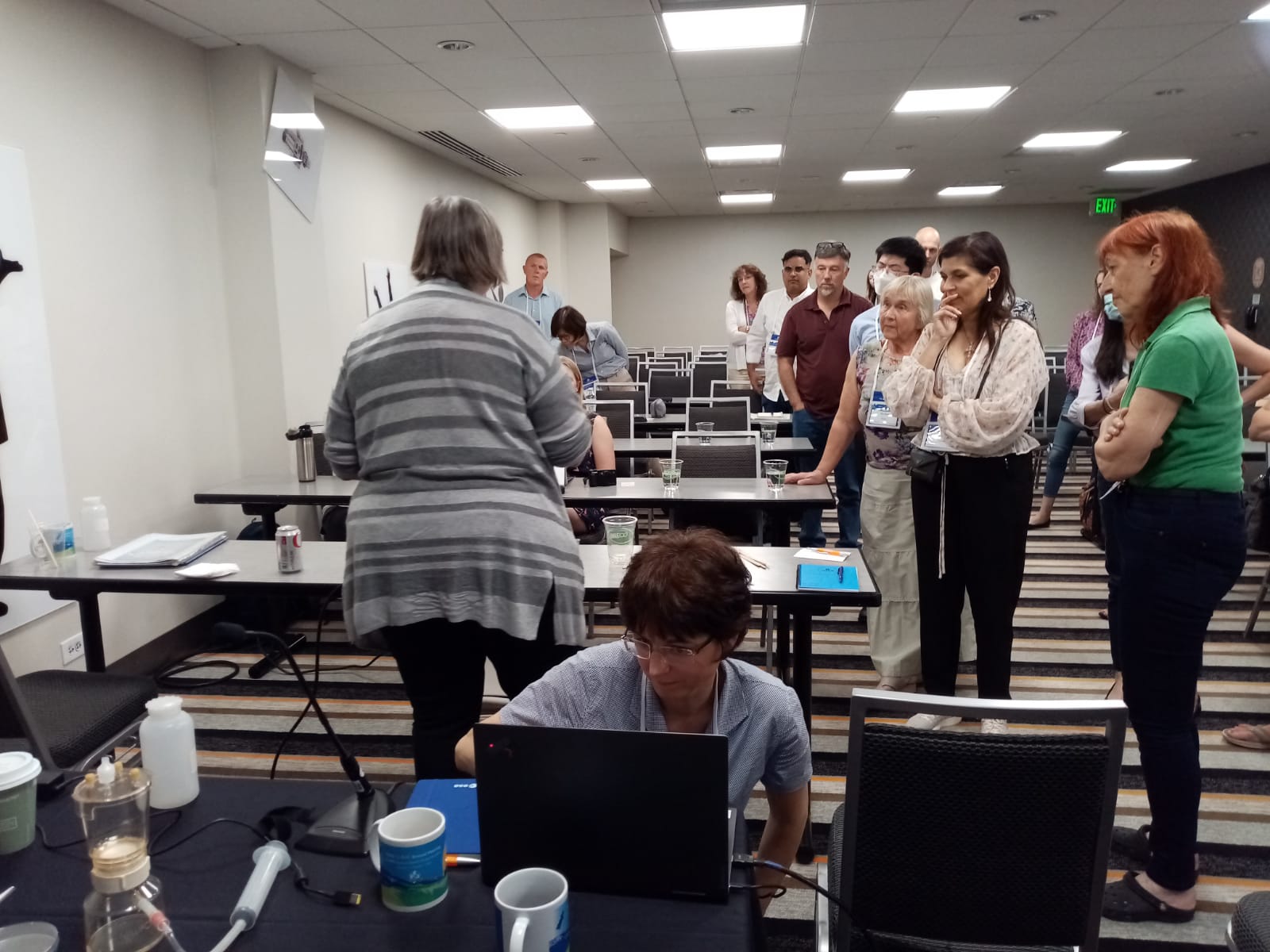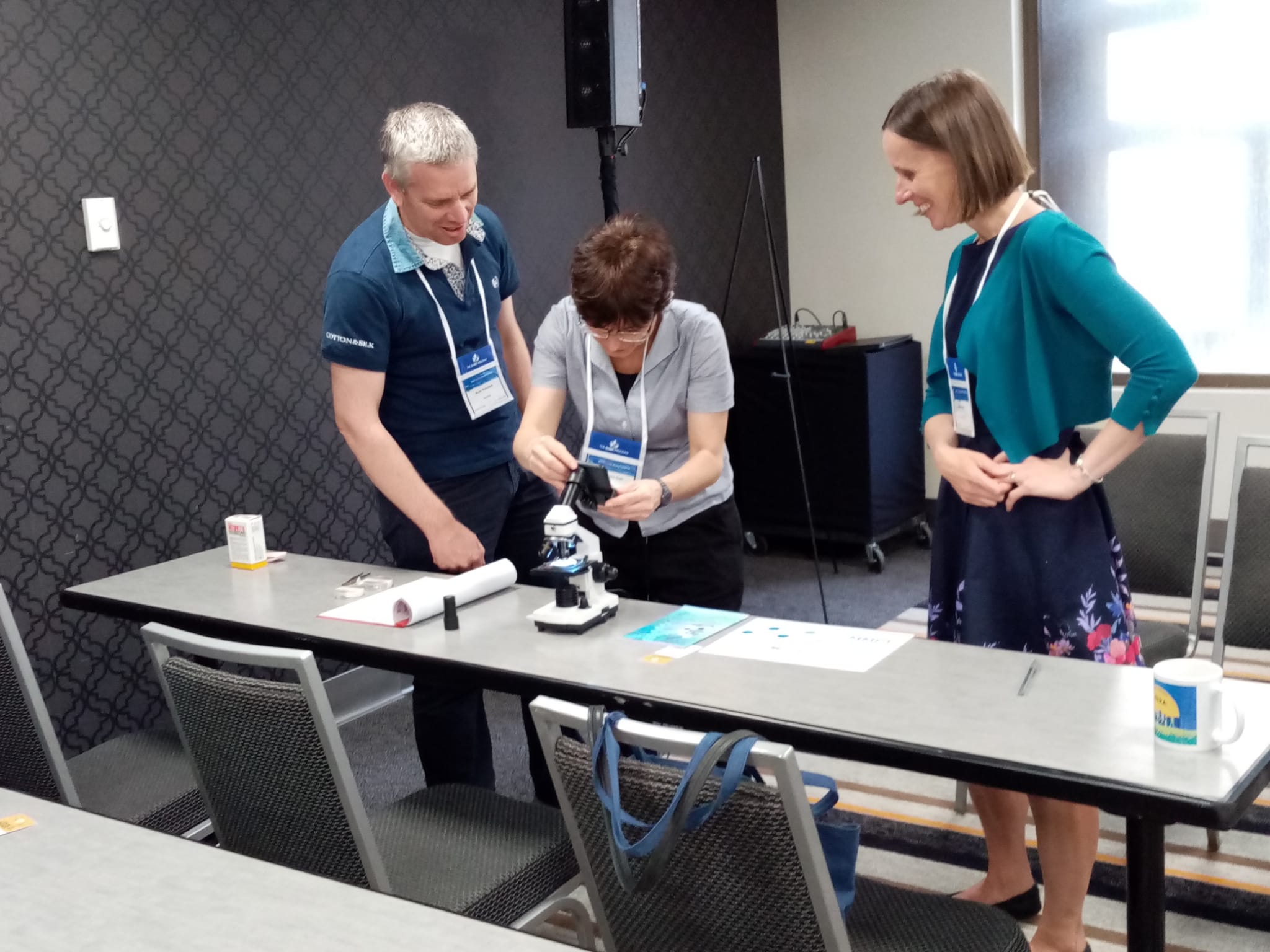Panel + mini-Workshop




Care Amiche e cari Amici,
il Convegno annuale di GLOBE 2023 in programma dal 17 al 20 luglio a Denver, Colorado, USA, sarà una tappa cruciale nel processo di avvicinamento del Microplastics Monitoring Protocol al GLOBE Program.
Infatti vi possiamo anticipare che al Protocollo saranno dedicati due momenti del Convegno:
1- un Lightning Talk di 6 minuti, seguito da 4 minuti di discussione lunedì 17 luglio, giorno di apertura del Convegno
2- un Panel seguito da un mini-Workshop di 90 minuti in agenda martedì 18 luglio.
Il Lighting Talk (LT) sarà a cura di Alessandra Sutti e Stuart Robottom della Deakin University (Australia), gli ideatori del Protocollo, e di Sandro Sutti che, con Lorella Rigonat, coordinatori nazionali di GLOBE Italia e LABTER-CREA, l'hanno implementato nella rete GLOBE con la preziosa collaborazione dell'Ufficio di Coordinamento della Regione GLOBE Europe-Eurasia di Praga, il GLOBE Asia and Pacific RCO e TERI, lstituto per l'Energia e le Risorse di India.
Il LT costituirà la premessa all'appuntamento del giorno dopo.
Il panel a cura della Deakin University e di GLOBE Italia, vedrà la partecipazione di prestigiosi ricercatori USA tra i quali Ed Carpenter, Professore Ordinario presso la University of California, San Francisco, il Dr Matt Ferner della stessa Università e la ricercatrice Tracy Ostrom della University of California, Berkely. La signora Ostrom e il Dr Ferner hanno sperimentato "4-day pacing guide on microplastics", una guida per un approccio ragionato e veloce al Protocollo. Qui il link al relativo articolo, pubblicato sul sito NSTA
ll Prof. Carpenter è un vero e proprio mito nel campo della ricerca delle microplastiche in ambienti oceanici e marini essendo stato il primo in assoluto a compiere studi in tal senso e a sollevare il problema delle loro possibili conseguenze.
Il fatto che questi ricercatori abbiano accettato il nostro invito a prendere parte al Panel è per noi un grande onore.
Così come è un onore oltre che un grande piacere che abbia accettato di parteciparvi anche Lenka Kleger, quale componente del GLOBE Europe-Eurasia RCO oltre che referente E-E dei progetti di GLOBE per la fenologia, che tanto successo stanno riscuotendo a livello globale.
Completano la rosa dei panelist la A/Prof. Alessandra Sutti e il Prof. Sandro Sutti; l'Ing. Stuart Robottom agirà in qualità di moderatore/conduttore del Panel.
Il mini- workshop che seguirà si focalizzerà sugli aspetti pratici del protocollo e sulla Pacing Guide.
Non sono esclusi nei giorni successivi del Convegno incontri con referenti GLOBE e NASA utili a discutere dell'avvio del processo di sottomissione del Protocollo per il suo riconoscimento tra i protocolli ufficiali del GLOBE Program.
Abbiamo ritenuto doveroso informarvi di ciò che succederà a Denver perché se il Protocollo ha raggiunto questo stadio di sviluppo è merito di tutti voi (e siete circa 500):
- che avete partecipato ai corsi di formazione;
- che avete posto domande e fatto rilievi che hanno messo in luce e permesso di superare criticità non previste dagli ideatori;
- che avete sperimentato il Protocollo con i vostri studenti e fatto proposte operative che ne hanno migliorato le procedure e in particolare lo stadio di validazione;
- che avete incoraggiato i vostri studenti a sperimentare il Protocollo anche in corpi idrici inizialmente non previsti (mari in superficie e in profondità, oceani, corsi d'acqua carsici);
- che avete organizzato in autonomia meeting con colleghi per informarli di ciò che stavate realizzando e cercare di coinvolgerli;
- che avete assistito i vostri studenti in azioni di comunicazione con altre classi o con altre scuole, in Science market, in convegni, conferenze, in attività di interazioni con gruppi sociali (speleologi, ricercatori, ecc.) o con le vostre comunità per informarle sui problemi derivanti dalla presenza delle microplastiche nelle sfere del pianeta e invitarle a minimizzare l'uso degli oggetti di plastica allungandone la vita dove possibile, o catalizzato ricerche originali da presentare a conferenze nazionali raccogliendo consensi e premi. E infine,
- che avete contribuito ad iniziare a costruire quella che è destinata a diventare la Banca dati e la Galleria immagini sulle microplastiche più grande e diffusa del mondo, aperta ad usi didattici e scientifici.
Tutto ciò porteremo con noi a Denver e tutto ciò costituirà la base della nostra proposta.
Non saremo dunque soli ad affrontare questo ultimo, difficile, ma anche eccitante, miglio del nostro percorso comune, perché tutti voi, cari amici e colleghi, sarete con noi con i vostri materiali e le vostre idee.
Grazie dunque di cuore per tutto quanto avete fatto e continuerete a fare perché questo Protocollo e questa problematica, che sta generando una grande preoccupazione a livello scientifico, ambientale e sanitario, trovino nel GLOBE Program adeguata cittadinanza.
Un caro saluto dai Team del MMPT, GLOBE Italia e LABTER-CREA
Sandro, Lorella, Alessandra e Stuart
PS: sarà nostra cura aggiornarvi degli stadi di sviluppo del processo che si avvierà a Denver
Sandro Sutti, Lorella Rigonat, Alessandra Sutti, Stuart Robottom
Globe Italia, Deakin University, Labter-Crea
_______________________________________________________
Dear MMPT Friends and Colleagues,
The GLOBE 2023 Annual Conference in Denver, Colorado, USA, July 17-20, will be a crucial step in the process of bringing the Microplastics Monitoring Protocol closer to the GLOBE Program.
In fact, two moments of the Conference will be dedicated to the Protocol:
1- a 6-minute Lightning Talk followed by a 4-minute discussion on Monday 17 July, the opening day of the Conference
2- a 90-minute Panel + a mini-Workshop scheduled for Tuesday 18 July.
The Lighting Talk (LT) will be curated by Alessandra Sutti (A/Prof.) and Stuart Robottom (Environmental Engineer) of Deakin University (Australia), the creators of the Protocol, and by Sandro Sutti who, with Lorella Rigonat, national coordinators of GLOBE Italia and LABTER-CREA, have implemented it in the GLOBE network with the precious collaboration of the GLOBE Europe-Eurasia RCO, GLOBE Asia and Pacific RCO and TERI, the Energy and Resources Institute of India. The LT will be the premise for the next day's event.
The panel curated by Deakin University and GLOBE Italia will see the participation of prestigious US researchers including Ed Carpenter, Full Professor at California San Francisco University, Dr Matt Ferner of the same University and Tracy Ostrom from the University of California, Berkely. Ms Ostrom and Dr Ferner piloted a "4-day pacing guide on microplastics". Prof. Carpenter is a real legend in the field of research on microplastics in oceanic and marine environments having been the very first to carry out studies and to raise the question of their possible consequences.
The fact that these researchers have accepted our invitation to take part in the Panel is a great honor for us.
It is also an honour as well as a great pleasure that Lenka Kleger also agreed to participate as a member of the GLOBE Europe-Eurasia RCO, and as the E-E referent of the GLOBE phenological projects, which are enjoying huge success globally.
The list of panelists is completed by A/Prof. Alessandra Sutti and Prof. Sandro Sutti; Eng. Stuart Robottom will act as panel moderator/conductor.
The mini-workshop that will follow will focus on the practical aspects of the Protocol and on the Pacing Guide.
Meetings with GLOBE and NASA representatives are foreseen in the days following the Conference. They will be useful to discuss the start of the Protocol submission process for its recognition among the official protocols of the GLOBE Program. We are aware that GLOBE is currently refining this process, and we look forward to being the first "users" of it.
We felt it was our duty to inform you of what will happen in Denver because if the Protocol has reached this stage of development it is thanks to all of you (and there are about 500 of you)
- who participated in the training courses
- who asked questions and made observations that light and permission to overcome critical issues not foreseen by the creators,
- who tested the Protocol with your students and made operational proposals that have improved the procedures and in particular the validation stage,
- who have encouraged your students to experiment with the Protocol also in bodies of water initially unforeseen (surface and deep seas, oceans, karst watercourses)
- who independently organized meetings with colleagues to inform them of what you were doing and try to involve them,
- who assisted your students in actions of communication with other classes or with other schools, in science markets, in conventions, conferences, in interaction with social groups (speleologists, researchers, etc.) or with your communities to inform them about the problems deriving from the presence of microplastics in the spheres of the planet and invite them to minimize the use of plastic objects by lengthening their life where possible, or as a catalyst for original research to be presented at national conferences, gathering acclaim and awards. And finally
- who have helped to start building what is destined to become the database and the world's largest and most widespread Microplastics Image Gallery, open for educational and scientific use.
We will bring all this with us to Denver and all this will form the basis of our proposal.
We will therefore not be alone in tackling this last difficult, but also exciting, mile of our common path because all of you, dear friends and colleagues, will be with us with your materials and your ideas.
So thank you very much for everything you have done and will continue to do, so that this Protocol and this problem, which is causing great concern at a scientific level. environment and health, find adequate citizenship in the GLOBE Program.
Warm greetings from the MMPT, GLOBE Italia and LABTER-CREA teams,
Sandro, Lorella, Alessandra and Stuart
PS: we will take care of updating you on the process that will start in Denver
Sandro Sutti, Lorella Rigonat, Alessandra Sutti, Stuart Robottom
Globe Italia, Deakin University, Labter-Crea


